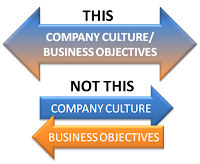Towers Watson recently published a report that removes all doubt about the importance of culture in high-performing organizations:
In a high-performance organization, workplace practices must actively influence the employee behaviors needed to execute its strategy and reinforce its market focus. …I think we can all easily agree that employee behaviors and actions are what ultimately execute company strategy. But the challenge is company culture often does not encourage the needed behaviors and actions or doesn’t tie them directly to company strategy. Again from the Towers Watson report:
When the culture and strategy align, both people and functions work toward a common purpose. … Culture, and all the systems that support it, must reinforce and reward these actions, behaviors and attitudes.
Many companies’ cultures are not aligned with their business objectives, because their leaders, who by and large focus on the financial and operational aspects of the business, simply allow corporate culture to evolve. In some cases, the responsibilities of day-to-day management intrude, or leaders do not have the tools necessary to identify and close the gaps between culture and strategy.What’s the tool that identifies and closes the gaps between culture and strategy? Strategic employee recognition. As Eric and I explain in Winning with a Culture of Recognition:
“Organizational culture is the most powerful force in business, and yet it is one of the most neglected (and misunderstood) attributes of any organization. Every organization has a culture, whether it is the culture the leadership wants or the one that has come to exist through inertia and management neglect. …Do you have tools you need to identify and close the gap between culture and strategy? Are you equipping your managers with what they need to help their employees see the connection between their behaviors and actions and achieving the company’s strategic objectives?
“Understanding your company’s culture and shaping it deliberately, based on your values, is critical to achieving your strategic objectives. It is critical to gaining competitive advantage. …
“Strategic recognition adds the ultimate layer of value, which is culture management. Strategic recognition is linked to strategic goals such as engagement, employee satisfaction, or culture change. But also, because you have those tools, you get to then use strategic recognition to manage the culture. In other words, you can emphasize a single value that you feel doesn’t have the traction you need to meet your strategic objectives.”












0 comment(s):
Post a Comment | Subscribe to: Post Comments